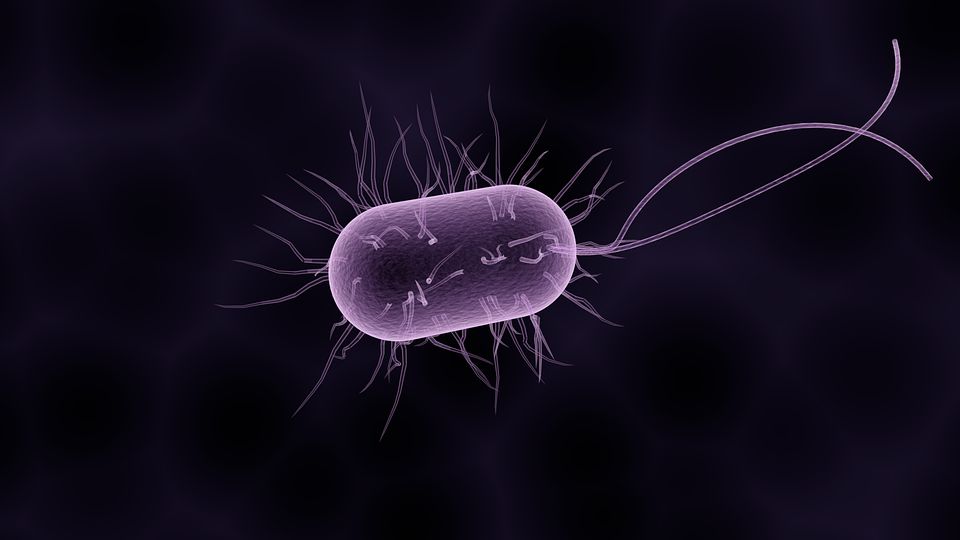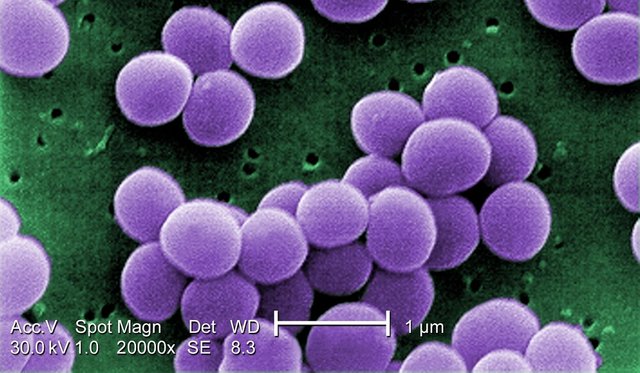Antibiotic Resistance - A Growing Health Concern #1
Please scroll down for the German version.
It is a growing concern in the medical world. Microbes are developing more and more antibiotic resistances and due to the long process of trials and testing we may run out of effective antibiotics. Many only know the term antibiotic resistance and the consequence, but what about the mechanism? This is the first post in this mini series about antibiotic resistance. I will post every Tuesday explaining different mechnisms by which microbes become resistant to bacteria. Today I will introduce this topic to you!
What Is Antibiotic Resistance?
When antibiotics are unable to effectively kill microbes or prevent microbial growth or multiplication we speak of antibiotic resistance (1). Some microbes developed a resistance against multiple antibiotics. Microbes such as Staphylococcus aureus have developed resistances to practically all available antibiotics (2). The problem is that bacteria develop a lot faster than we can develop drugs. This is due to relatively high mutation rates (due to notorious errors in transcription, translation and even replication) (3), as well as horizontal gene transfer (4). This results in a dangerous phenomenon. There is a risk that a bigger fraction of infections will become uncureable (especially in hospitals) (5). There are two different types of antibiotic resistance, intrinsic resistance and acquired resistance. Intrinsic resistance is due to naturally occuring variations in the microbial genome (6). Acquired resistance occurs when a microbe is exposed to an antibiotic and becomes resistant due to genetic changes (6).
Clinical Impact
The CDC estimates that each year at least 2.049.442 people get infected with antibiotic resistant microbes in the USA - of those, 23000 die (7). This is only the USA and the numbers are alarming. The WHO calls antibiotic resistance "one of the biggest threats to global health, food security, and development today" (8). This shows that antibiotic microbes are a global concern. The WHO provides statistics about the occurance of antibiotic resistances. From these statistics it becomes evident that antibiotic resistances are a global problem and occur in basically every country (9). Some countries are taking measures that have been shown some success. A great example are the Netherlands. The "search and destroy" policy states that patients belong to a certain risk group, as well as patients that have been shown to have MRSA are quickly isolated, in order to prevent spreading of the microbes (10). While the Netherlands seem to have achieved some success, most countries are not implementing similar strategies. From personal experience, German hospitals do not have the capacities to use similar strategies. There is simply not enough space, and no indication that there will be any improvement.
Another alarming statistic is the prevalence of multidrug resistant tuberculosis. According to the WHO 3.6% of all new and 20.2% of previously treated cases are estimated to be cases of multidrug resistant tuberculosis (9). The WHO states that 10.4 million people got infected with tuberculosis and 1.7 million died in 2016 (11).
My Opinion
The global rise of drug resistant microbes is alarming and we need to take action. The first step has been taken, and that is the recognition of the problem. Now more countries need to take appropriate actions. I fear that many countries will not be able to implement such measures due to the financial strain or health systems that are simply operating at their limits. This is an issue that will require policy makers, doctors and scientists to work together. Drug companies will need to develop new antibiotics (which are not the financially most attractive drugs to make), while new policies have to aim to prevent the spread of drug resistant germs. Scientists need to develop new, faster and cheaper tests.
Shameless Self-Advertisement
This was only the introduction post. Next Tuesday I will start to describe mechanisms by which microbes have developed antibiotic resistances.
Thank you for reading. If you liked this post, please upvote and resteem. There is more to come so stay tuned for next Tuesday´s post! Maybe you like some of my other posts so please feel free to check my blog.
As always,
Cheers @lesshorrible!
::::::::::::::::::::::::::::::: Deutsche Version :::::::::::::::::::::::::::::::
Antibiotische Resistenz - Ein Wachsendes Medizinisches Problem #1
Es ist eine wachsende Sorge in der medizinischen Welt. Mikroben entwickeln mehr und mehr Antibiotika-Resistenzen und aufgrund des langen Prozesses der Versuche und Tests die nötig sind um ein Antibiotikum zu zu lassen, könnte es sein dass uns bald die wirksamen Antibiotika ausgehen. Viele kennen nur den Begriff Antibiotikaresistenz und die offensichtliche Konsequenz, aber was ist mit dem Mechanismen? Dies ist der erste Beitrag in dieser Mini-Serie über Antibiotikaresistenz. Ich werde jeden Dienstag verschiedene Mechanismen erklären, mit denen Mikroben resistent gegen Antibiotika werden. Heute werde ich euch dieses Thema vorstellen!
Wenn Antibiotika nicht in der Lage sind Mikroben wirksam abzutöten oder mikrobielles Wachstum oder Vermehrung zu verhindern, spricht man von Antibiotikaresistenz (1). Einige Mikroben Resistenzen gegen multiple Antibiotika entwickelt. Mikroben wie Staphylococcus Aureus haben Resistenzen gegen praktisch alle verfügbaren Antibiotika entwickelt (2). Das Problem ist, dass sich Bakterien schneller entwickeln als Medikamente. Dies liegt an der relativ hohen Mutationsraten (aufgrund von häufigen Fehlern in der Transkription, Translation und sogar Replikation) (3) sowie am horizontalen Gentransfer (4). Dies führt zu einem gefährlichen Phänomen. Es besteht das Risiko, dass ein immer größerer Teil der Infektionen (insbesondere in Krankenhäusern) nicht mehr heilbar ist (5). Es gibt zwei verschiedene Arten von Antibiotikaresistenzen, Intrinsische Resistenz und Erworbene Resistenz. Die Intrinsische Resistenz beruht auf natürlich vorkommenden Variationen im mikrobiellen Genom (6). Von Erworbener Resistenz spricht man wenn eine Mikrobe einem Antibiotikum ausgesetzt wird und durch genetische Veränderungen resistent wird (6).
Klinischer Impakt
Die CDC schätzt, dass sich in den USA jedes Jahr mindestens 2.049.442 Menschen mit antibiotikaresistenten Keimen infizieren - davon sterben 23.000 (7). Diese Statistik betrifft zwar nur die USA jedoch sind die Zahlen alarmierend. Die WHO nennt Antibiotikaresistenz "eine der größten Bedrohungen für die globale Gesundheit, die Ernährungssicherheit und die Entwicklung heute" (8). Dies zeigt, dass Antibiotika-resistente Mikroben ein globales Anliegen sind. Die WHO liefert Statistiken über das Auftreten von Antibiotikaresistenzen. Aus diesen Statistiken wird ersichtlich, dass Antibiotikaresistenzen ein globales Problem darstellen und in fast allen Ländern auftreten (9). Einige Länder ergreifen Maßnahmen, die sich als erfolgreich erwiesen haben. Ein gutes Beispiel sind die Niederlande. Die "Search and Destroy" -Politik besagt, dass Patienten die zu einer bestimmten Risikogruppe gehören, ebenso wie Patienten, bei denen MRSA nachgewiesen wurde, schnellstmöglich isoliert werden, um eine Ausbreitung der Mikroben zu verhindern (10). Während die Niederlande anscheinend einige Erfolge erzielt haben, setzen die meisten Länder keine ähnlichen Strategien um. Als Beispiel dient hier Deutschland. Aus persönlicher Erfahrung weiß ich dass deutsche Krankenhäuser nicht über die Kapazitätenverfügen ähnliche Strategien anzuwenden. Es gibt einfach nicht genug Platz und keinen Hinweis darauf, dass es Verbesserungen geben wird.
Eine andere alarmierende Statistik ist die Prävalenz von multiresistenter Tuberkulose. Nach Angaben der WHO werden 3,6% aller neuen und 20,2% der zuvor behandelten Fälle als Fälle multiresistenter Tuberkulose eingestuft (9).
Meine Meinung
Der weltweite Anstieg von medikamentenresistenten Mikroben ist alarmierend und wir müssen etwas unternehmen. Der erste Schritt ist getan, und das ist die Anerkennung des Problems. Jetzt müssen mehr Länder geeignete Maßnahmen ergreifen. Ich befürchte dass viele Länder aufgrund der finanziellen Belastung oder der Gesundheitssysteme, die bereits an ihren Grenzen arbeiten, solche Maßnahmen nicht umsetzen können. Dies ist ein Problem, bei dem politische Entscheidungsträger, Ärzte und Wissenschaftler zusammenarbeiten müssen. Die Pharmaunternehmen werden neue Antibiotika entwickeln müssen (die nicht die finanziell attraktivsten Medikamente sind), während neue Maßnahmen darauf abzielen müssen, die Ausbreitung arzneimittelresistenter Keime zu verhindern. Wissenschaftler müssen neue, schnellere und billigere Tests entwickeln die auch in Entwicklungsländern genutzt werden können.
Scharmlose Eigenwerbung
Dies war nur eine Einleitung in das Thema Antibiotische Resistenz. Nächsten Dienstag werde ich dann damit anfangen die verschiedenen Mechanism zu ertklären mit denen Mikroben resistent gegen Antibiotika werden.
Vielen Dank dass ihr meinen heutigen Post gelesen habt. Bitte voten meinen Beitrag up wenn er euch gefallen hat. Vielleicht mögt ihr auch andere Beiträge die ich geschrieben habe. Fühlt euch frei meinen Blog zu checken.
Wie immer,
Cheers @lesshorrible!


Being A SteemStem Member
The reality is that doctors do just as much harm as good. They prescribe the antibiotics just to shut a patient up rather than educate. We have lost so many good drugs because people insist on taking them like vitamins.
Yeah, people tend to use antibiotics when they are not necessary (like in viral infections). I would not just blame doctors but patients just as much, as well as educators. There are a lot of issues that need to be fixed with antibiotic resistance. Cheers!
I was fascinated, I should make some informative posters of that, since it costs in my case to explain to the patients that the self-medication and the antibiotics taken without the consent of the doctor what generates them is an enormous resistance that causes the doctor to place higher doses .
Yes! Are you a doctor @jennifer.jimenez? If so I would really like to hear about your take on this. Cheers!
Im dentist (=
Cool! Maybe you can give some more information about what @bestofhealth has stated.
Cheers!
I'm going to look at that to see what contributions I can make, thank you very much.
There are more things between heaven and earth than school medicine!! But I like the pictures! Lovely!
Yes there really are. Something I would like to see more is people learning to trust their immune systems a little bit more. Medicine still is important, but as all evolving sciences, there are mistakes that we are now recognizing. I am excited to read more new research about this since my last time reporting about antibiotic resistance was roughly 4 years ago. Thank you @martinamartini! Cheers!
I agree that both doctors and dentists have been too ready to prescribe antibiotics, sometimes in cases of mild infections which would have resolved anyway, and some, especially with dentists, as emergency treatment instead of properly opening and draining an abscess for example..
Apparently some antibiotics are becoming ineffective and this leads to combinations being prescribed but ultimately even these could become less than effective.
Unfortunately it seems that really new antibiotics are not easy to find or cost effective to develop so this is a problem that really needs addressing as you so rightly say.
Yeah we really need to change the way that we think about antibiotics and their use. I cannot really speak about appropriate and inappropriate treatments done by dentists (because I am not a dentist haha). But I will write about some studies that show correlations between antibiotic use and occurrence of resistant strains. Thank you for your comment. Cheers!
excellent publication friend greetings I invite you to go through my last publication